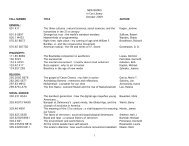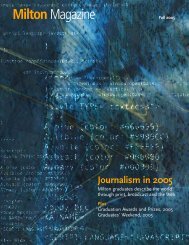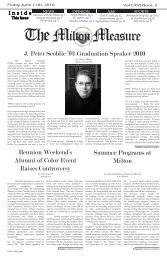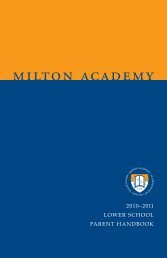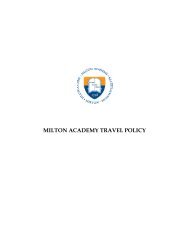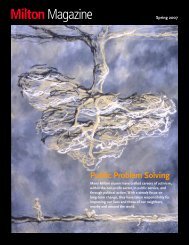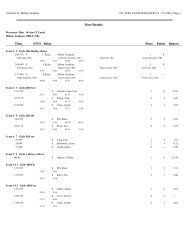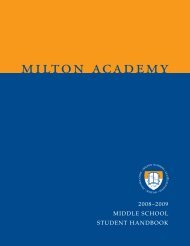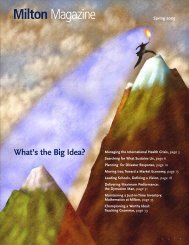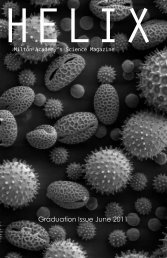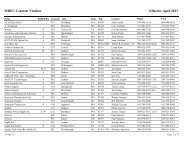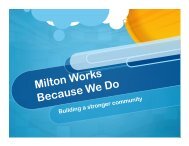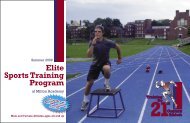Milton Magazine - Milton Academy
Milton Magazine - Milton Academy
Milton Magazine - Milton Academy
- No tags were found...
Create successful ePaper yourself
Turn your PDF publications into a flip-book with our unique Google optimized e-Paper software.
“ Those of us who teach <strong>Milton</strong> students must still distinguish thefundamentals from the fads, the transcendent from the trendy.Making those decisions seems simple at times, daunting at others…students must leave this place able to explore enthusiastically, reasoncritically, and communicate clearly.”Irecently stumbled across a batteredold cardboard box lying in the cornerof a garage. Curiosity got the best ofme, and in it I discovered the remnants ofmy Class II year at <strong>Milton</strong>. Humidity hadtaken its toll on the English essays that hadspewed forth from an old dot matrix printer,and the rust on the binder rings made ithard to flip through the scrawled notes onthe Civil War and Reconstruction, limitsand derivatives. For two decades, the physicalremains of that year had been rottingaway. But something from that year restssecure in my mind, shaping the ways inwhich I think and read and speak. So whatis it about my <strong>Milton</strong> <strong>Academy</strong> educationthat has resisted time’s ravages? What is itabout the classroom experience at <strong>Milton</strong>,the defining experience at <strong>Milton</strong>, thatendures?Such questions are not for the nostalgicalone. Those of us who teach <strong>Milton</strong> studentsmust still distinguish the fundamentalsfrom the fads, the transcendent fromthe trendy. Making those decisions seemssimple at times, daunting at others, butwhenever the task seems overwhelming,I return to principles that extend across thecurriculum, penetrating every academicdiscipline—students must leave this placeable to explore enthusiastically, reasoncritically, and communicate clearly. Only arigorous, dynamic program ensures thatthey will.By necessity, that program must beginwith language, broadly understood.Generations of <strong>Milton</strong>’s English teachershave insisted that their students masterthe principles of grammar, and despitethe culture’s current embrace of imprecisionand informality, <strong>Milton</strong>’s teachersresolutely, often joyfully, continue to teachthose principles. They are not soldiers insome cultural battle, ferociously defendingpast practice against innovation. Rather,they recognize that learning grammar, likelearning vocabulary, liberates students.Understanding how words fit together tocreate meaning allows one to read withsensitivity, appreciate nuance, and recognizemultiple meanings. The complicatedlanguage that once obscured knowledgeand beauty instead introduces a reader tonew dimensions of the human experience.The world on the page comes alive. Thus,English Workshop remains a staple of theClass IV English curriculum, essentialpreparation for subsequent deep readingsof <strong>Milton</strong>, Melville, and Morrison.In other disciplines, too, language matters.We still require Class IV students toexplore a wide range of the arts—visualarts, performing arts, and music—becausewe recognize that a student who, for example,begins to understand the language ofmusic, its structure, its texture, its complexity,can discover once-hidden truthsabout love, or hope, or suffering. In themath classroom, signs and symbols canmake mysterious phenomena seem simpleand rational—but only when studentsunderstand the way in which those signswork together, the grammar, if you will, ofmath. In the Chinese or French classroom,of course, the teaching of language mayappear to be a teacher’s sole focus. Yet thestudy of another language does more thanprovide an alternative form of communication.Rather, learning new languagesprovides the basis for understanding othercultures. In a world of constant, complexcultural exchange, studying languagethus becomes increasingly important, notbecause English will lose its global reach,but because foreign languages provide theentry for deeper understanding.As they discover new knowledge, <strong>Milton</strong>students enjoy many small epiphanies, butthose moments, no matter how powerful,are not sufficient signs that <strong>Milton</strong> hascompleted its work. After those flashes ofinsight, <strong>Milton</strong> students must still remainhungry, eager to learn more; they mustmake intellectual exploration habitual. Wein turn must encourage that habit, followingthe lead of the science department,which puts exploration at the heart ofevery one of its core courses. All studentsin those classes must complete a “DYO,”a “design-your-own” experiment requiringstudents to define and then test waysto explore scientific phenomena. Beforethey can explore, those students must posequestions worthy of study; they must havea sense of what they seek. Some students,mucking about in hopes that they willstumble on a subject worthy of investigation,ask many, many questions. At themoment, such incessant questioning canseem frustrating, but that questioning fostersa pioneer spirit, the very kind of intellectualapproach that endures.A similar search for answers definesanother rite of passage, the United StatesHistory research paper. This assignment,often the stuff of legend, demands thatstudents define their own path for explor-<strong>Milton</strong> <strong>Magazine</strong> 3



